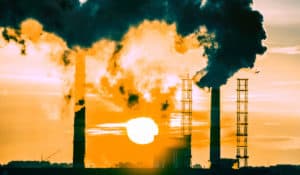Tuesday, December 18th, 2018
Stephan: I am posting this, even though I do not agree with all of it. I'm doing this because this piece is one of a series of articles and essays I have begun seeing depicting what I see as a good news trend. It is beginning to become clear to people looking at climate change that a society based only on profit simply cannot make the decisions necessary to effectively deal with climate change.
To be effective, one has to begin with the premise that all policies must foster wellbeing from the individual to the family, community, nation, and the planet itself, and you can't do that when you are driven by greed and all you care about is profit. The 2020 election, in my view, is going to hinge on this issue and, unless something changes, I think we are going to fail. I just checked fivethirtyeight.com and today Trump's approval rating is 42.2%, more or less where it has been the entire time he has been president. To continue to approve of Trump, given the endless criminality the media describes every day, one has to be willfully ignorant, racist, and rather stupid, and millions of Americans are. Moreover, a large percentage of socially progressive men and women are too lazy or too sectarian or purist to vote at all. Put that mix together and I can guarantee your grandchildren will despise you.

Credit: Darksoul72/shutterstock
International climate negotiations have failed to curb runaway greenhouse gas emissions since the first UN treaty on emission reductions was adopted in 1992. Consumer-focused solutions to climate change such as eating less meat or reducing food mileage, though important, simply won’t be enough to address the systemic nature of the crisis. So what needs to be done to halt global warming? Truthout spoke to Simon Pirani about his newest book, Burning Up: A Global History of Fossil Fuel Consumption, and the prospects for transitioning to a post-fossil fuel world.
Anton Woronczuk: Burning Up situates the last few decades of accelerating fossil fuel consumption alongside the social and economic history of energy production and policy. How does this context help us understand what is driving, and what has driven, the growth of greenhouse gas emissions through today?
Simon Pirani: When people think about the threat of dangerous climate change, and decide they want to do something about it, it is not easy to work out what to do. It is clear we have to move away […]











I’ll not be the first nor the last to state, that we’ve collectively left this multi-scenario collapse far too long, to allow any effective mediation through voting to make a difference. We all saw that in your Ooos-ahh midterms.
A collapse of Capitalism and all its derivatives, would allow humans the space to make changes that may reverse or forestall the 6th mass extinction taking down the species. No one knows nor can predict.
15 yr. old Swedish schoolgirl Greta Thunberg said it best at the COP-pted out 24, “System change, not climate change.”
I totally agree with you John, system change, either to a social-democratic capitalism or a complete change to socialism (without any fascist attachments), would be what would change the scene from climate denial to a climate change agenda.